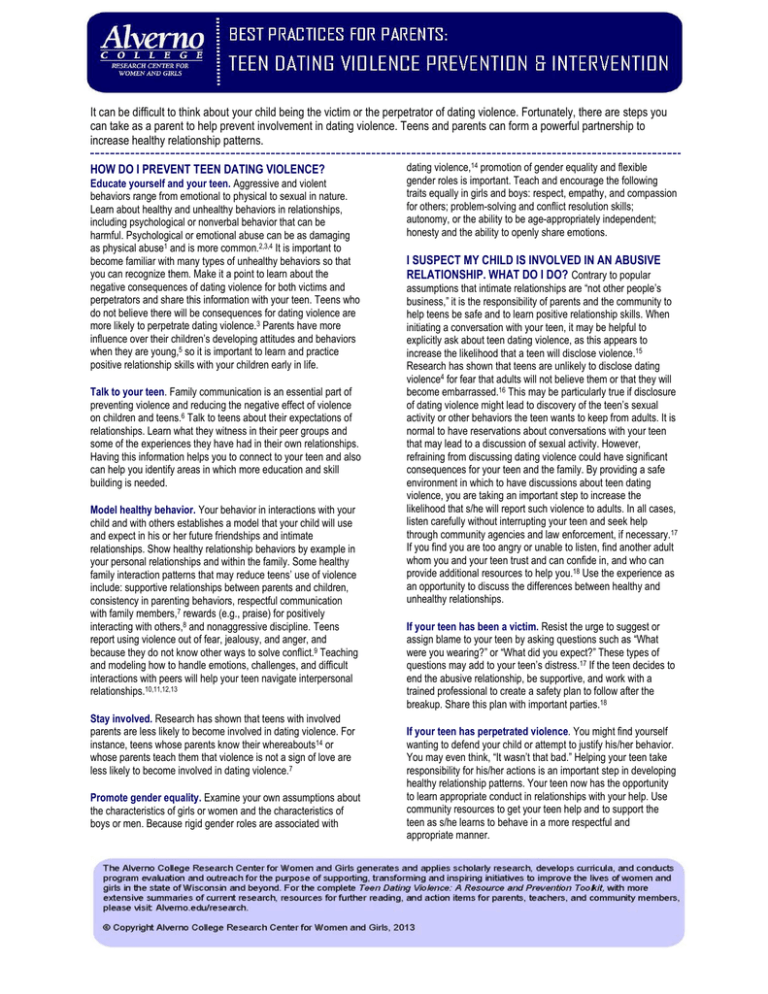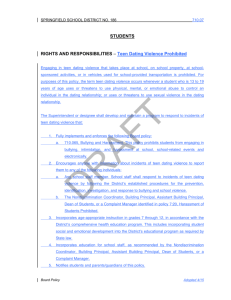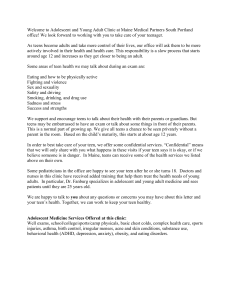
It can be difficult to think about your child being the victim or the perpetrator of dating violence. Fortunately, there are steps you
can take as a parent to help prevent involvement in dating violence. Teens and parents can form a powerful partnership to
increase healthy relationship patterns.
HOW DO I PREVENT TEEN DATING VIOLENCE?
Educate yourself and your teen. Aggressive and violent
behaviors range from emotional to physical to sexual in nature.
Learn about healthy and unhealthy behaviors in relationships,
including psychological or nonverbal behavior that can be
harmful. Psychological or emotional abuse can be as damaging
as physical abuse1 and is more common.2,3,4 It is important to
become familiar with many types of unhealthy behaviors so that
you can recognize them. Make it a point to learn about the
negative consequences of dating violence for both victims and
perpetrators and share this information with your teen. Teens who
do not believe there will be consequences for dating violence are
more likely to perpetrate dating violence.3 Parents have more
influence over their children’s developing attitudes and behaviors
when they are young,5 so it is important to learn and practice
positive relationship skills with your children early in life.
Talk to your teen. Family communication is an essential part of
preventing violence and reducing the negative effect of violence
on children and teens.6 Talk to teens about their expectations of
relationships. Learn what they witness in their peer groups and
some of the experiences they have had in their own relationships.
Having this information helps you to connect to your teen and also
can help you identify areas in which more education and skill
building is needed.
Model healthy behavior. Your behavior in interactions with your
child and with others establishes a model that your child will use
and expect in his or her future friendships and intimate
relationships. Show healthy relationship behaviors by example in
your personal relationships and within the family. Some healthy
family interaction patterns that may reduce teens’ use of violence
include: supportive relationships between parents and children,
consistency in parenting behaviors, respectful communication
with family members,7 rewards (e.g., praise) for positively
interacting with others,8 and nonaggressive discipline. Teens
report using violence out of fear, jealousy, and anger, and
because they do not know other ways to solve conflict.9 Teaching
and modeling how to handle emotions, challenges, and difficult
interactions with peers will help your teen navigate interpersonal
relationships.10,11,12,13
Stay involved. Research has shown that teens with involved
parents are less likely to become involved in dating violence. For
instance, teens whose parents know their whereabouts14 or
whose parents teach them that violence is not a sign of love are
less likely to become involved in dating violence.7
Promote gender equality. Examine your own assumptions about
the characteristics of girls or women and the characteristics of
boys or men. Because rigid gender roles are associated with
dating violence,14 promotion of gender equality and flexible
gender roles is important. Teach and encourage the following
traits equally in girls and boys: respect, empathy, and compassion
for others; problem-solving and conflict resolution skills;
autonomy, or the ability to be age-appropriately independent;
honesty and the ability to openly share emotions.
I SUSPECT MY CHILD IS INVOLVED IN AN ABUSIVE
RELATIONSHIP. WHAT DO I DO? Contrary to popular
assumptions that intimate relationships are “not other people’s
business,” it is the responsibility of parents and the community to
help teens be safe and to learn positive relationship skills. When
initiating a conversation with your teen, it may be helpful to
explicitly ask about teen dating violence, as this appears to
increase the likelihood that a teen will disclose violence.15
Research has shown that teens are unlikely to disclose dating
violence4 for fear that adults will not believe them or that they will
become embarrassed.16 This may be particularly true if disclosure
of dating violence might lead to discovery of the teen’s sexual
activity or other behaviors the teen wants to keep from adults. It is
normal to have reservations about conversations with your teen
that may lead to a discussion of sexual activity. However,
refraining from discussing dating violence could have significant
consequences for your teen and the family. By providing a safe
environment in which to have discussions about teen dating
violence, you are taking an important step to increase the
likelihood that s/he will report such violence to adults. In all cases,
listen carefully without interrupting your teen and seek help
through community agencies and law enforcement, if necessary.17
If you find you are too angry or unable to listen, find another adult
whom you and your teen trust and can confide in, and who can
provide additional resources to help you.18 Use the experience as
an opportunity to discuss the differences between healthy and
unhealthy relationships.
If your teen has been a victim. Resist the urge to suggest or
assign blame to your teen by asking questions such as “What
were you wearing?” or “What did you expect?” These types of
questions may add to your teen’s distress.17 If the teen decides to
end the abusive relationship, be supportive, and work with a
trained professional to create a safety plan to follow after the
breakup. Share this plan with important parties.18
If your teen has perpetrated violence. You might find yourself
wanting to defend your child or attempt to justify his/her behavior.
You may even think, “It wasn’t that bad.” Helping your teen take
responsibility for his/her actions is an important step in developing
healthy relationship patterns. Your teen now has the opportunity
to learn appropriate conduct in relationships with your help. Use
community resources to get your teen help and to support the
teen as s/he learns to behave in a more respectful and
appropriate manner.





